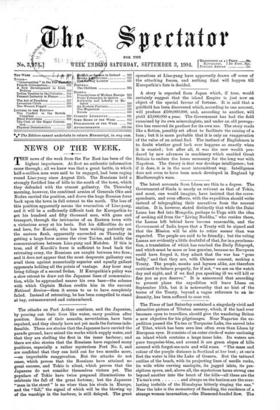T HE news of the week from the Far East has
been of the highest importance. At first no authentic information came through ; all we knew was that a great battle, in which half-a-million men were said to be engaged, had been raging round Liao-yang since August 25th. The Russians held a strongly fortified line of hills to the south of the town, which they defended with the utmost gallantry. On Thursday morning, however, the combined armies of Generals Oku and Nodzu carried the position, and drove the huge Russian force back upon the town in full retreat to the north. The loss of this position apparently means the evacuation of Liao-yang, and it will be a sufficiently difficult task for Kuropatkin to get his hundred and fifty thousand men, with guns and transport, through the intricacies of an Eastern town with a victorious army at his heels. But his difficulties do not end here, for Kuroki, who has been waiting patiently on the eastern flank, apparently succeeded on Thursday in getting a large force across the river Tai-tse, and holds the communications between Liao-yang and Mukden. If this is true, and if Kuroki's force is sufficient to head back the retreating army, the Russians are caught between two fires ; and it does not appear that the most desperate gallantry can avail them against numerically superior and equally gallant opponents holding all the points of vantage. Any hour may bring tidings of a second Sedan. If Kuropatkin's policy was a slow retreat to draw out the Japanese lines of communica- tion, while he approached nearer his own base—the scheme with which Captain Mahan credits him in the current National Review—then it seems to us to have completely failed. Instead of retreating, he has been compelled to stand at bay, outmanceuvred and outnumbered.






































